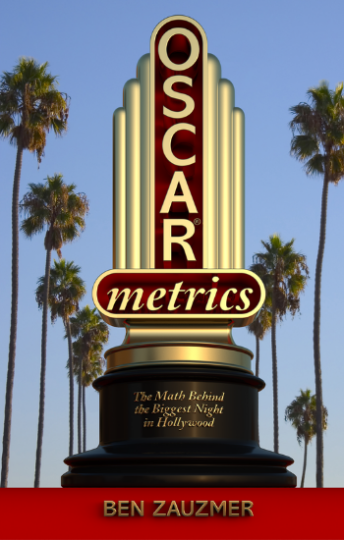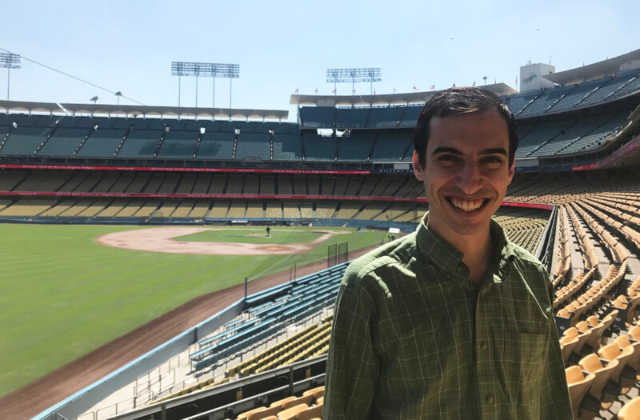The tension was palpable. Hundreds of Hollywood elite waited with bated breath for Colin Firth to announce the Best Actress winner during the 84th Academy Awards. The audience erupted with cheers when he said the name Meryl Streep.
Three thousand miles away, Harvard freshman Ben Zauzmer felt a wave of relief and joined the celebration. He had created a mathematical model that predicted Streep would win best actress, even though film experts had pegged Viola Davis for her role in “The Help.”
“When Meryl Streep won best actress, that was the one that really felt like it vindicated this project,” said Zauzmer, A.B. ’15, an applied math concentrator at the John A. Paulson School of Engineering and Applied Sciences. “It all just kind of developed after that.”
Since 2012, Zauzmer has been making math-based predictions of Oscar winners, first as a fun side project to share with his college friends, and now a correspondent for the Hollywood Reporter. The work inspired him to write a book, “Oscarmetrics: The Math Behind the Biggest Night in Hollywood.”
But although he predicts Oscar winners with impressive accuracy, he never predicted his love of math would lead him down this path.
Growing up in the Philadelphia suburbs, his affinity for numbers led him to join math leagues, where he excelled at local and regional competitions.
“I was an applied math guy even before I knew the difference between applied math and pure math,” he said. “I love the fact that you can take these tools and use them to understand the world around us.”
A movie buff since childhood, he thought it might be fun to use math to predict Oscar winners. He did some Googling and couldn’t find any mathematical predictions on the full slate of categories that used all the data available.
So he spent the next month making multiple daily trips to Lamont Library to gather data on past winners of Oscars and other film awards. Without one coherent data source, Zauzmer scanned websites and online movie databases, and even dug through old press releases.
“You hear a lot about big data. This is the opposite—small data. There is very little data when it comes to the Oscars,” he said. “We are really only talking about 20 or so years of Oscar history, because most of what I do is take previous award shows and figure out how well that predicts the different categories of the Oscars. It would be almost like trying to predict the outcome of a baseball game if only 20 or 30 games had been played in history.”
And even once he finds the data he needs, some factors aren’t captured very well by the numbers.
For instance, a movie may sweeps through the Sundance Film Festival and Golden Globes and seem on track for an Oscars win, only to have scandal derail its chances for an Academy Award. That scenario wouldn’t show up in the stats.
Despite those anomalies, Zauzmer’s model performed admirably in 2012, and he continued to make predictions for fun each year—until he got a call from an editor at the Hollywood Reporter. He’s been writing for the magazine, making predictions for the Oscars and Tony Awards, ever since.
In some ways, “Oscarmetrics” is a culmination of his work; the project had been at the back of his mind for years. Each chapter uses math to answer a different question about the Oscars, like quantifying the biggest upsets in Academy Awards history.
“I loved gathering the data for the book. I know that sounds like the dry part, but in gathering the data, you learn all the quirky, weird stories that happened over the years of the Oscars,” he said. “Just getting to share this with the world is exciting for me. I love thinking and talking about math.”
Math also forms the crux of Zauzmer’s day job. He works as manager of baseball analytics for the Los Angeles Dodgers.
He serves as a liaison between the research and development team, which is focused on long-term statistical modeling, and the managers and players. His role involves effectively communicating mathematical findings and distilling that information into implementable baseball strategy.
In some ways, the challenges he faces are opposite those that impact Oscars predictions.
“In baseball, there is more data on a single pitch than you have for an entire year of Oscars nominations. A lot of what we do is dive through the data to find the signals, the things that are predictive,” he said. “It is a game of trying to blend the conclusions we get from mathematical sources with non-math information to make the best decisions.”
And it’s a game that Zauzmer loves to play. An avid sports fan, he revels in the opportunity to work at Dodgers Stadium. Using math and statistics to make an impact on the team is very rewarding, he said.
He also hopes to make an impact with “Oscarmetrics” by showing people that math, despite its bad reputation as a dry or confusing subject, can actually be fascinating and fun.
“One of the things I really focused on in writing this book is to make it not only understandable, but enjoyable for someone who has never taken a statistics class,” he said. “I’m not interested in teaching a pure math class. For me, the fun of this is using math to create these conclusions and then sharing them with a much wider audience than you’d find in a statistics classroom.”
Press Contact
Adam Zewe | 617-496-5878 | azewe@seas.harvard.edu


